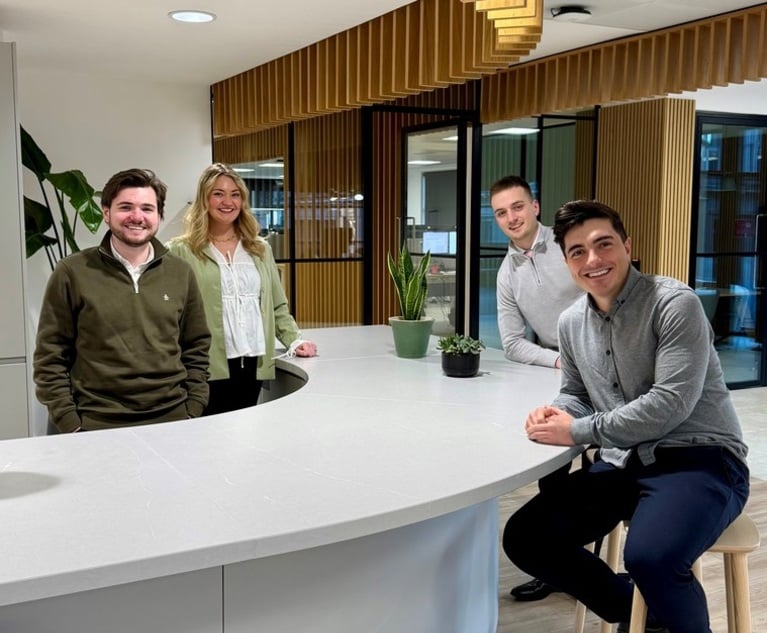How Rocket Scientists Are Helping Clayton Utz Push Into Forensics
The Australian firm has brought together law and forensic science to address such matters as harassment allegations, company fraud and data breaches.
November 25, 2019 at 05:00 AM
5 minute read
Hiring a rocket scientist and promoting an IT expert who has no law degree to partner might sound like unusual moves for a law firm. But they form part of Australian firm Clayton Utz's push into technology and forensic services.
Launched close to three years ago, Clayton Utz's Forensic and Technology Services offering brings together the legal component with the investigatory and forensic aspects of matters such as bullying and harassment allegations, fraud within companies and discovery.
"The service is about that collecting information, about analysing that information and producing it in a way that lawyers can give the right advice in an efficient manner and in an effective manner to clients to make those business decisions," said Paul Fontanot, the national practice group leader of the Forensic and Technology Services team.
It is work that was typically carried out by large accounting firms, but Fontanot says lawyers are catching up. "The law firms have not traditionally, in my experience, invested heavily in technology solutions," he said. "They use the word 'innovation' but it's not as adaptive as what the accounting firms have invested in technology."
However, more law firms in Australia and globally are pushing into non-legal services as they seek to capture more work from clients and defend their turf against legal offerings from accounting firms.
The firm's FTS team now numbers more than 140 people, most of them data scientists, mathematicians, actuaries, accountants and IT forensics experts. Only a handful are lawyers. But the team works with lawyers in other practice groups at the firm, which is one of the two remaining independent firms that were once part of what was known as the 'Big Six'. The other four either merged or formed associations with firms from other countries.
Earlier this year, Clayton Utz hired a woman who built her first computer at the age of six and a man with a degree in astrophysics.
"The way that he processes information in terms of the way he thinks is unbelievable," Fontanot said. "Here's a youngster that thinks differently from a lawyer yet can help solve problems by coming at it with a different, diverse skillset."
FTS grew out of Clayton Utz's eDiscovery offering when Fontanot joined from Ernst & Young in 2017 to launch the new capability. A forensic accountant – not a lawyer – he became the firm's first partner without a law degree.
Owen Bourke, a director at Clayton Utz who has a background in forensic investigations and previously worked for the Australian government's tax office and for its corporate regulator, will become the firm's second non-lawyer partner, starting January 1.
The promotion is an indication that FTS is considered a practice area in its own right with the potential for staff promotion, Fontanot said.
"It is absolutely a selling point for recruitment," he said. "Individuals are looking at this and saying, 'we're not the shared office or shared back-office support function', [seeing] that there is a prospect of them progressing through the ranks with an opportunity of becoming a partner."
FTS investigates fraud and corruption for clients and also offers consulting services to try to mitigate these occurrences by drawing on data analytics to examine payroll data, accounts data and emails to spot any unusual patterns.
There is also litigation support with document management, identifying the information an organisation has and using mathematicians and data scientists to collect and analyse it. This service has been kept busy by the various government inquiries that have arisen in Australia during the past couple of years, into such sectors as finance, aged care and the institutional abuse of children.
A cyber incident response offering investigates how a breach or a leak occurred, how hackers gained access and what they might have left behind. "Instead of outsourcing that to a Big Four accounting firm or IT firm, we can do that in-house and give it to the legal team to actually help with their reporting obligations for their client," Fontanot said.
Some of the work FTS has undertaken helps companies understand their supply chain so they can comply with the Modern Slavery Act. They identify and examine suppliers by analysing accounting records, due diligence reports and media reports.
When the firm is called in by a company on a fraud matter, legal issues arise, such as whether the incident is reported to the police, what happens to the fraudster and how any funds might be recovered. But these decisions require evidence to support the lawyers' advice and actions.
"We'll go in and image and forensically capture the person's laptop, their mobile phone. We'll search the offices or office. We'll gather their emails. We'll look at which websites they've been clicking on because quite often they'll have a personal email address on the work computer," Fontanot said.
FTS also works with several Australian sporting codes to determine whether any players have been breaching rules on sports betting, and it conducts internal audits of three large share-market-listed companies. Separate from the statutory audits required by financial regulations, these audits seek to detect fraud as well as inappropriate behaviours, such as the misuse of travel or entertainment accounts.
Fontanot said the service has gone from strength to strength in the nearly three years it has been operating. It exceeded its three-year budget target by 50% in the first year of operation, he said, adding that he expects other firms to follow.
"I wonder, in the next short while, that law firms here in Australia will probably need to think about their strategies and see whether there are changes that they need to make, particularly around technology and innovation," he said.
This content has been archived. It is available through our partners, LexisNexis® and Bloomberg Law.
To view this content, please continue to their sites.
Not a Lexis Subscriber?
Subscribe Now
Not a Bloomberg Law Subscriber?
Subscribe Now
NOT FOR REPRINT
© 2025 ALM Global, LLC, All Rights Reserved. Request academic re-use from www.copyright.com. All other uses, submit a request to [email protected]. For more information visit Asset & Logo Licensing.
You Might Like
View All
‘Raises More Questions Than Answers’: Partners Puzzled by Leadership Change at UK Competition Regulator


Long Hours, Lack Of Boundaries: Associates In India Are Leaving Their Firms
Law Firms Mentioned
Trending Stories
- 1New York-Based Skadden Team Joins White & Case Group in Mexico City for Citigroup Demerger
- 2No Two Wildfires Alike: Lawyers Take Different Legal Strategies in California
- 3Poop-Themed Dog Toy OK as Parody, but Still Tarnished Jack Daniel’s Brand, Court Says
- 4Meet the New President of NY's Association of Trial Court Jurists
- 5Lawyers' Phones Are Ringing: What Should Employers Do If ICE Raids Their Business?
Who Got The Work
J. Brugh Lower of Gibbons has entered an appearance for industrial equipment supplier Devco Corporation in a pending trademark infringement lawsuit. The suit, accusing the defendant of selling knock-off Graco products, was filed Dec. 18 in New Jersey District Court by Rivkin Radler on behalf of Graco Inc. and Graco Minnesota. The case, assigned to U.S. District Judge Zahid N. Quraishi, is 3:24-cv-11294, Graco Inc. et al v. Devco Corporation.
Who Got The Work
Rebecca Maller-Stein and Kent A. Yalowitz of Arnold & Porter Kaye Scholer have entered their appearances for Hanaco Venture Capital and its executives, Lior Prosor and David Frankel, in a pending securities lawsuit. The action, filed on Dec. 24 in New York Southern District Court by Zell, Aron & Co. on behalf of Goldeneye Advisors, accuses the defendants of negligently and fraudulently managing the plaintiff's $1 million investment. The case, assigned to U.S. District Judge Vernon S. Broderick, is 1:24-cv-09918, Goldeneye Advisors, LLC v. Hanaco Venture Capital, Ltd. et al.
Who Got The Work
Attorneys from A&O Shearman has stepped in as defense counsel for Toronto-Dominion Bank and other defendants in a pending securities class action. The suit, filed Dec. 11 in New York Southern District Court by Bleichmar Fonti & Auld, accuses the defendants of concealing the bank's 'pervasive' deficiencies in regards to its compliance with the Bank Secrecy Act and the quality of its anti-money laundering controls. The case, assigned to U.S. District Judge Arun Subramanian, is 1:24-cv-09445, Gonzalez v. The Toronto-Dominion Bank et al.
Who Got The Work
Crown Castle International, a Pennsylvania company providing shared communications infrastructure, has turned to Luke D. Wolf of Gordon Rees Scully Mansukhani to fend off a pending breach-of-contract lawsuit. The court action, filed Nov. 25 in Michigan Eastern District Court by Hooper Hathaway PC on behalf of The Town Residences LLC, accuses Crown Castle of failing to transfer approximately $30,000 in utility payments from T-Mobile in breach of a roof-top lease and assignment agreement. The case, assigned to U.S. District Judge Susan K. Declercq, is 2:24-cv-13131, The Town Residences LLC v. T-Mobile US, Inc. et al.
Who Got The Work
Wilfred P. Coronato and Daniel M. Schwartz of McCarter & English have stepped in as defense counsel to Electrolux Home Products Inc. in a pending product liability lawsuit. The court action, filed Nov. 26 in New York Eastern District Court by Poulos Lopiccolo PC and Nagel Rice LLP on behalf of David Stern, alleges that the defendant's refrigerators’ drawers and shelving repeatedly break and fall apart within months after purchase. The case, assigned to U.S. District Judge Joan M. Azrack, is 2:24-cv-08204, Stern v. Electrolux Home Products, Inc.
Featured Firms
Law Offices of Gary Martin Hays & Associates, P.C.
(470) 294-1674
Law Offices of Mark E. Salomone
(857) 444-6468
Smith & Hassler
(713) 739-1250










